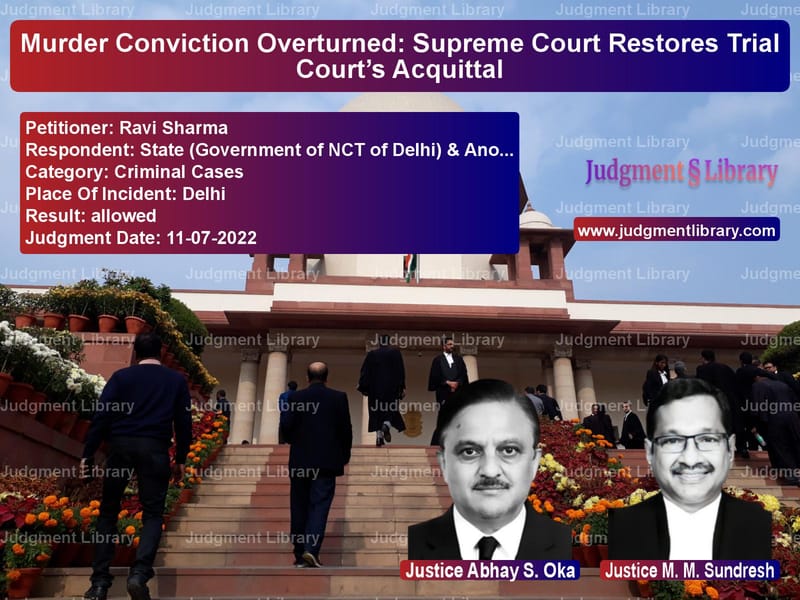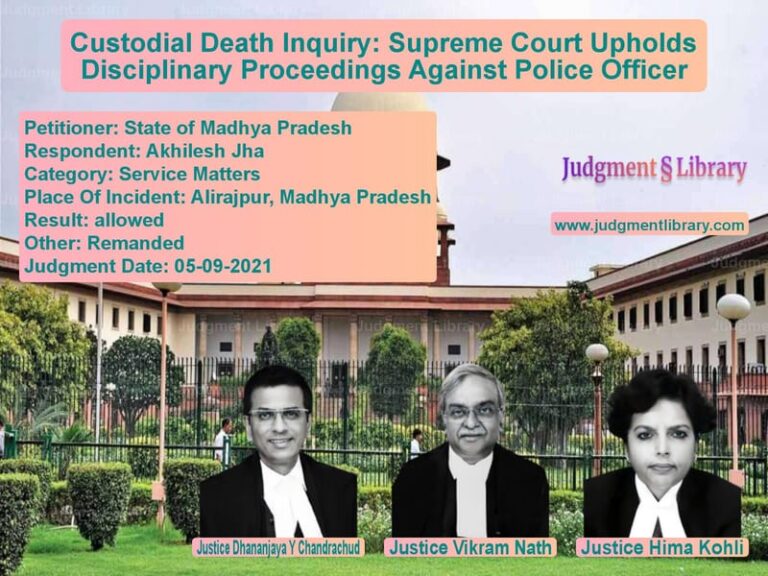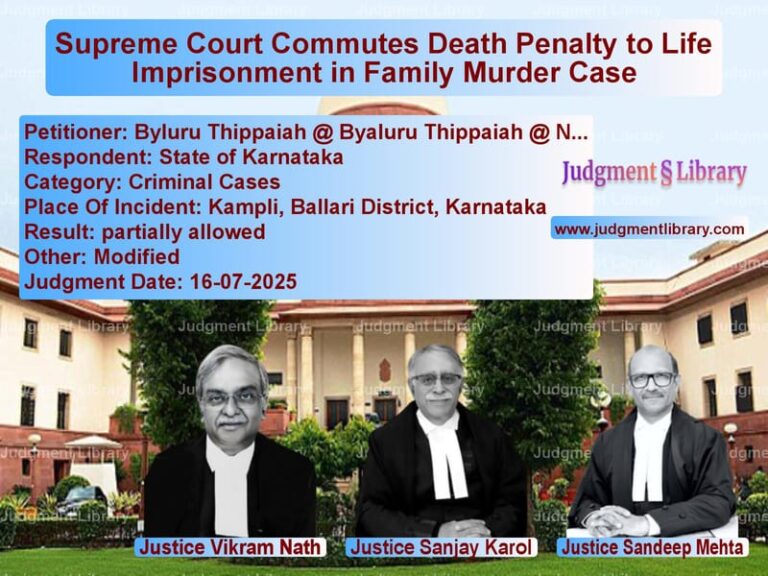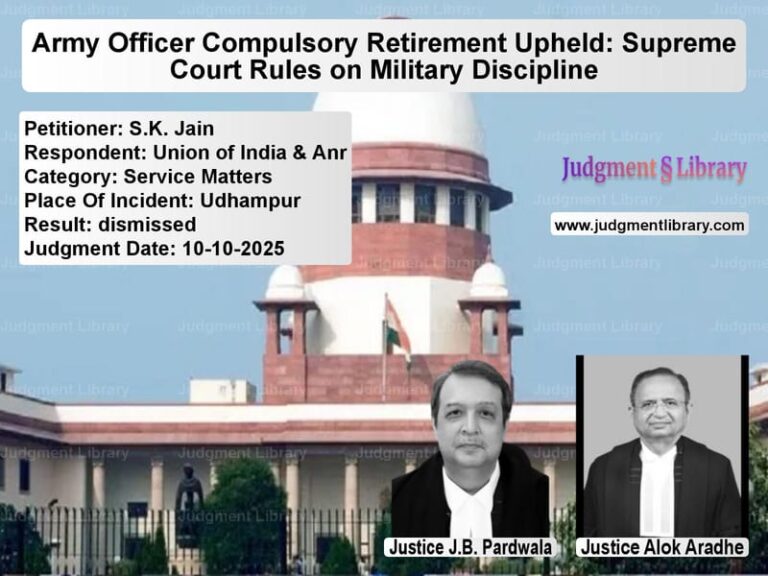Murder Conviction Overturned: Supreme Court Restores Trial Court’s Acquittal
The case of Ravi Sharma vs. State (Government of NCT of Delhi) & Another revolved around the conviction of the appellant for murder, which was overturned by the Supreme Court after analyzing the evidence and procedural lapses in the investigation. The Supreme Court, in its judgment delivered by Abhay S. Oka and M. M. Sundresh, set aside the Delhi High Court’s conviction and restored the acquittal granted by the trial court.
The key issue before the Supreme Court was whether the High Court was justified in reversing the trial court’s judgment based on circumstantial evidence, primarily the alleged recovery of a firearm under Section 27 of the Indian Evidence Act and the existence of motive.
Background of the Case
The case originated from an FIR registered on 30 May 2011, following the discovery of a dead body. The deceased’s brother (PW2) identified the body, and initial statements from the father (PW1) and PW2 did not point to any suspect. However, a day later, both witnesses raised suspicions about the accused, Ravi Sharma, who was a friend of the deceased.
The prosecution relied on circumstantial evidence, primarily:
- Alleged motive based on financial disputes between the deceased and the accused.
- Recovery of a firearm allegedly used in the crime.
- A ballistic expert’s report linking the recovered firearm to the crime.
Trial Court’s Judgment
The District and Sessions Judge, North-East District, Karkardooma Court, Delhi, acquitted Ravi Sharma, citing several inconsistencies in the prosecution’s case. The key findings of the trial court were:
- The alleged motive was not established beyond doubt.
- The recovery of the firearm was suspicious and not properly corroborated by independent witnesses.
- The forensic report was inconclusive in linking the firearm to the crime.
- The last-seen theory was unconvincing, as witnesses failed to establish the accused’s presence with the deceased around the time of the incident.
High Court’s Judgment
The Delhi High Court overturned the acquittal, relying on:
- The existence of motive, as testified by PW2.
- The recovery of the firearm, which the High Court found credible.
- The circumstantial chain of events allegedly linking the accused to the crime.
The High Court reasoned that while the trial court had rightly rejected the last-seen theory, the motive and firearm recovery were sufficient to convict the accused.
Supreme Court’s Analysis
The Supreme Court critically examined whether the High Court had justifiably reversed the acquittal. It reaffirmed that in cases of circumstantial evidence, courts must adhere to stringent legal standards before convicting an accused.
Double Presumption of Innocence
The Court reiterated that an acquitted individual enjoys a double presumption of innocence. It cited the principle from Jafarudheen vs. State of Kerala:
“An appellate court reviewing an acquittal must exercise restraint, as the presumption of innocence is reinforced by the trial court’s decision.”
Failure to Prove Motive
The Supreme Court found the prosecution’s case on motive weak. PW2 had testified about a financial dispute between the accused and the deceased, but there was no independent corroboration.
The Court cited Tarsem Kumar vs. Delhi Administration:
“Motive plays a crucial role in cases based on circumstantial evidence. A weak or unproven motive cannot substitute for concrete evidence.”
Dubious Firearm Recovery
The Court found significant lapses in the firearm recovery process:
- Independent witnesses were not involved.
- PW2 was asked to sign the recovery documents, raising doubts about the credibility of the evidence.
- Police officials provided inconsistent statements on how and where the firearm was recovered.
Forensic Evidence Was Inconclusive
The Supreme Court highlighted that the ballistic expert’s report did not definitively establish that the recovered firearm was used in the crime. The trial court had rightly given the benefit of doubt to the accused.
Errors in the High Court’s Approach
The Supreme Court observed that the High Court had erred in re-evaluating the evidence without giving due weight to the trial court’s findings. It cited N. Vijayakumar vs. State of Tamil Nadu:
“If two views are possible, the one favoring acquittal must be preferred, as the trial court has the advantage of assessing witnesses firsthand.”
Supreme Court’s Ruling
The Supreme Court ruled:
- The High Court’s conviction order was unjustified.
- The trial court’s acquittal was based on plausible reasoning and was not perverse.
- The conviction was set aside, and the appellant was acquitted.
Conclusion
The Supreme Court’s judgment reinforces the principle that circumstantial evidence must form a complete chain before convicting an accused. It also underscores that appellate courts should be cautious in overturning acquittals, especially when the trial court’s findings are reasonable.
This ruling serves as an important precedent in criminal law, emphasizing the need for concrete evidence in cases built on circumstantial links.
Petitioner Name: Ravi Sharma.Respondent Name: State (Government of NCT of Delhi) & Another.Judgment By: Justice Abhay S. Oka, Justice M. M. Sundresh.Place Of Incident: Delhi.Judgment Date: 11-07-2022.
Don’t miss out on the full details! Download the complete judgment in PDF format below and gain valuable insights instantly!
Download Judgment: ravi-sharma-vs-state-(government-of-supreme-court-of-india-judgment-dated-11-07-2022.pdf
Directly Download Judgment: Directly download this Judgment
See all petitions in Bail and Anticipatory Bail
See all petitions in Murder Cases
See all petitions in Fraud and Forgery
See all petitions in Judgment by Abhay S. Oka
See all petitions in Judgment by M.M. Sundresh
See all petitions in allowed
See all petitions in supreme court of India judgments July 2022
See all petitions in 2022 judgments
See all posts in Criminal Cases Category
See all allowed petitions in Criminal Cases Category
See all Dismissed petitions in Criminal Cases Category
See all partially allowed petitions in Criminal Cases Category







